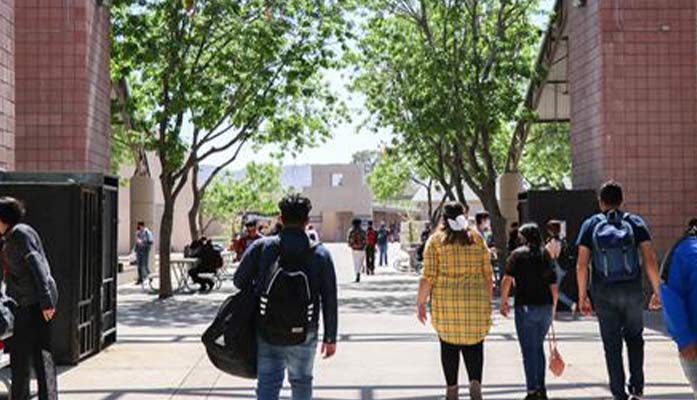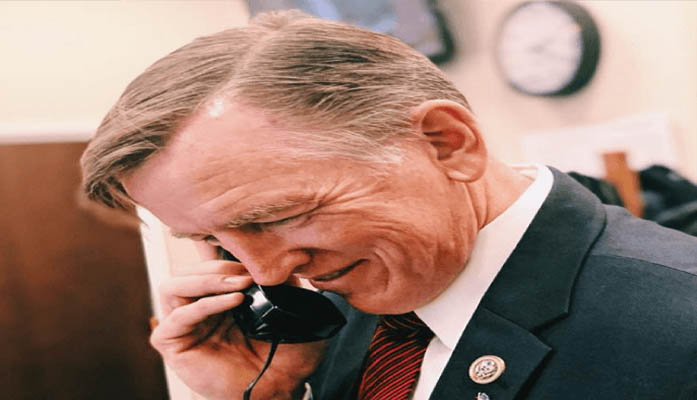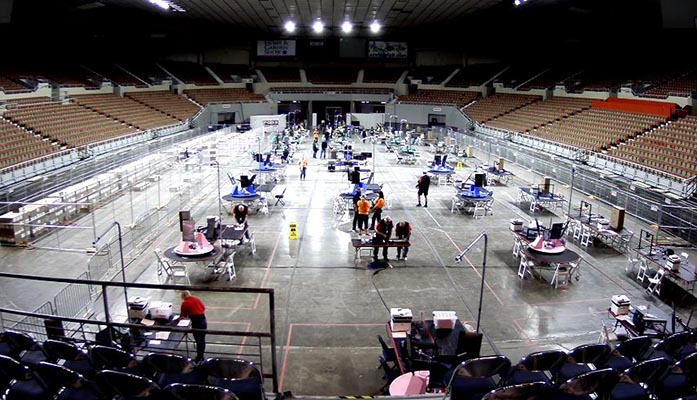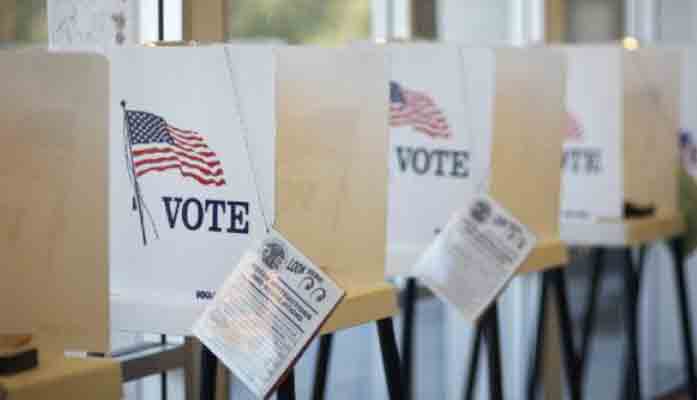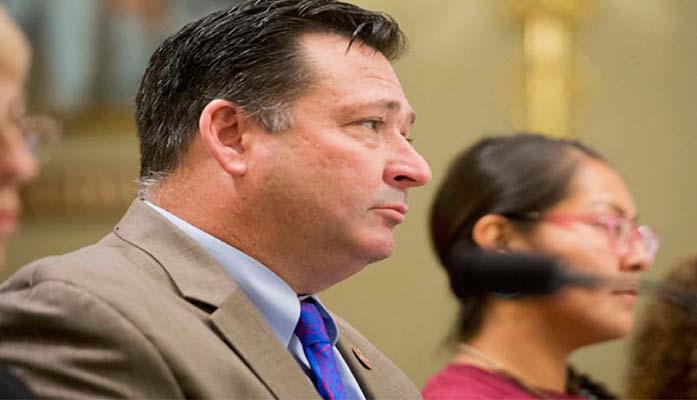
by Corinne Murdock | Aug 5, 2021 | News
By Corinne Murdock |
A Maricopa County Superior Court judge did not rule on the Phoenix Union High School District’s (PXU) mask mandate during an emergency hearing Wednesday. The Kolodin Law Group filed on behalf of PXU biology teacher Douglas Hester on Monday, requesting an injunction against PXU’s mandate issued several days earlier.
PXU’s superintendent and governing board members were named as defendants in the lawsuit.
According to the new state law, no schools may require face coverings or the COVID-19 vaccine as a condition of in-person learning. The lawsuit pointed out that the law includes a retroactive clause for the mask and vaccine prohibition. Therefore, those parts of the law were expected to take effect on June 30.
Alexander Kolodin with Kolodin Law Group told AZ Free News that this lawsuit will determine whether government is bound to the law. He added that this case was an important determinant in restoring people’s faith in their governing system. According to Kolodin, Hester wasn’t the only teacher that voiced concern over the mask mandate.
“This lawsuit is simply about whether the government needs to follow the law or whether the government is above the law,” explained Kolodin. “The people’s duly elected representatives arrived at the idea that in the case of schools, the tradeoff between mandating masks and personal liberty was in favor of not mandating masks. That was the voice of the people.”
Kolodin credited State Representatives Jake Hoffman (R-Queen Creek) and Jacqueline Parker (R-Mesa) for their hand in the legislation prohibiting K-12 mask and vaccine mandates.
“Obviously the people of Arizona have been applying a lot of pressure to elected officials concerning these pandemic-mandated countermeasures,” said Kolodin. “[These] two state legislators worked with their constituents to get legislation passed to try to balance the interest of people and their liberty.”
Read the Kolodin Law Group filing on behalf of Hester (CV2021-012160) here.
Corinne Murdock is a reporter for AZ Free News. Follow her latest on Twitter, or email tips to corinnejournalist@gmail.com.

by Corinne Murdock | Aug 4, 2021 | Economy, News
By Corinne Murdock |
Representative Paul Gosar, DDS (R-AZ-04) debuted a new series on Sunday to keep his constituents in the loop: “The Gosar Minute.” The series offers fast-hitting facts, commentary, and solutions for current issues, presented by Gosar’s staffers in the style of traditional broadcast journalism.
Gosar’s latest series may be difficult to find, however. AZ Free News discovered that Twitter has hidden the tag #GosarMinute under its “Sensitive Content” setting. Any users searching for #GosarMinute on Twitter with their search settings hiding sensitive content won’t be able to find those Gosar Minute posts. However, users will be able to locate the Gosar Minute postings on Gosar’s congressional Twitter page.
Twitter says that “sensitive media” may fall into the following categories: graphic violence, adult content, violent sexual content, gratuitous gore, and hateful imagery.
The premiere episode featured Gosar’s intern, Faith Graham, discussing how Department of Justice (DOJ) Attorney General Merrick Garland refused to meet with Gosar and Representatives Louie Gohmert (R-TX-01), Marjorie Taylor Greene (R-GA-14), and Matt Gaetz (R-FL-01) to discuss the mistreatment and physical abuse of those imprisoned for nonviolent offenses committed at the Capitol on January 6.
“Today I am launching ‘The Gosar Minute.’ My team will discuss current events in short one minute clips and my take or involvement in them,” wrote Gosar. “Today’s topic is my recent visit to the DOJ with @RepMTG @RepMattGaetz @replouiegohmert ENJOY!”
https://twitter.com/repgosar/status/1421939921070305284
Gosar’s affiliate, Beni Harmony, presented Wednesday’s Gosar Minute. The latest episode focused on President Joe Biden’s border crisis and Gosar’s proposed solution: a ten-year pause on all immigration at the southern border to stymie issues caused by the unchecked influx of illegal immigrants.
“#GosarMinute[:] We cannot have legal immigration when we are experiencing an invasion of rampant illegal immigration at our southern border. It’s a threat to our national security and economy. We must wrap our arms around this and press pause until we do. #10yearmoratorium[.]”
https://twitter.com/RepGosar/status/1422944588667494402
On his personal account, Gosar retweeted the debut episode of Gosar Minute with a clarification: this series is part of what he calls the “Gosar News Network.”
“The Gosar News Network back at it dropping truth bombs like it’s my business,” wrote Gosar. “#GNN #GosarNewsNetwork #GosarMinute.”
https://twitter.com/DrPaulGosar/status/1422950014754639877
Corinne Murdock is a reporter for AZ Free News. Follow her latest on Twitter, or email tips to corinnejournalist@gmail.com

by Terri Jo Neff | Aug 4, 2021 | News
By Terri Jo Neff |
While the public awaits the Arizona Senate’s report on how Maricopa County conducted the 2020 General Election, one senator is demanding Arizona Attorney General Mark Brnovich investigate the actions of the county’s board of supervisors in connection to the audit.
On Tuesday, Sen. Sonny Borelli (R-LD5) formally called on the attorney general to launch an investigation of the county board’s refusal to fully comply with Senate subpoenas issued in January and July as part of the audit. State law obligates Brnovich, also a Republican, to determine within 30 days whether the county has violated state statutes.
Should a violation of state law have occurred, Maricopa County could lose its portion of Arizona’s shared sales taxes. As of June 30, the county had benefited from shared sales taxes to the tune of $700 million, according to public records.
Borelli was not the only state lawmaker upset Tuesday by Maricopa County’s official attitude toward the Senate audit.
Rep. Jake Hoffman (R-LD12) accused the board of supervisors of engaging in “one of the most divisive and dangerous subversions of government” ever witnessed in Arizona.
“The Board’s blatant disregard for the Constitution and public mockery of the lawful oversight of elections by the Arizona legislature is not only disrespectful, it undermines the very fabric of our Republic,” Hoffman added. “Through its obstructionism, lack of transparency, and outright trampling of the Constitution, the Board of Supervisors has effectively spit in the face of every voter in Maricopa County and this state.”
Hoffman’s statement was in response to ongoing comments by Jack Sellers, the Republican chair of the county board, who has been openly critical of the Senate’s audit.
On Monday, Sellers chastised the Senate for hiring auditors with “no experience and little understanding” of how elections are run. He also characterized the audit as an “adventure in never-never land.”
“If you haven’t figured out that the election in Maricopa County was free, fair, and accurate yet, I’m not sure you ever will,” Sellers wrote. “There was no fraud, there wasn’t an injection of ballots from Asia nor was there a satellite that beamed votes into our election equipment.”
Sellers also called on elected officials “to tell the truth and stop encouraging conspiracies” and he challenged the Senate to be prepared to defend any accusations of misdeeds by the county.
“It’s time to move on,” Sellers wrote at the end of his letter.
Sellers’ tone and tenor is the norm for public comments issued by county officials about the audit, including a July 16 tweet by @MaricopaCounty which called the audit contractors “unqualified and untrained.” The tweet also repeated a common county mantra about the unreliability of any data put forth by Cyber Ninjas, the company Fann hired to conduct the Senate’s audit.
In other audit-related news, Judge Michael Kemp of the Maricopa County Superior Court issued an order Tuesday mandating Fann to comply with a request submitted in May for audit-related documents.
American Oversight sued Fann and the Senate after Fann and the Senate’s attorneys denied the non-profit advocacy group access to several audit-related documents via a public record request. The Senate turned over a number of documents, but several were denied on the basis that those documents were in the possession of Cyber Ninjas and its subcontractors, thus not qualifying as public records.
Kemp turned away Fann’s efforts last month to dismiss American Oversight’s lawsuit. Then on Tuesday, the judge ruled Arizona’s public records law requires the disclosure of the remaining documents.
According to Kemp’s ruling, Cyber Ninjas and its various subcontractor are private companies -not officers or public bodies- but are “clearly agents of the Senate Defendants.” Thus the Senate has a duty “to keep and maintain all records relating to this audit,” including all records of Cyber Ninjas and its subcontractor.
“Whether these public documents are in the actual physical control or possession of Senate Defendants is irrelevant to their duties and obligations,” under Arizona’s public records law, the judge ruled. Kemp added that claims that the senators have not seen the requested Cyber Ninjas documents does not carry water.
“Willful blindness does not relieve Senate Defendants from their duties and obligations” under the public records law, he ruled.
It is expected that the Senate will file with the Arizona Court of Appeals for review of Kemp’s ruling.

by Terri Jo Neff | Aug 3, 2021 | News
By Terri Jo Neff |
Current Secretary of State Katie Hobbs and former Phoenix-area television news anchor Kari Lake are nearly even in a favorability, according to a survey released Monday by Phoenix-based OH Predictive Insights (OHPI) about the top 8 candidates for the 2022 gubernatorial race.
The six-day Arizona Public Opinion Pulse survey of Arizona registered voters started July 6 and revealed Hobbs, a Democrat, rated a combined 40 percent for very or somewhat favorable. Lake, a Republican, came in at 39 percent very or somewhat favorable.

The next closest was Kimberly Lee, Arizona’s Treasurer and a Republican, with a 32 percent very or somewhat favorable rating.
In a head-to-head rating of the 5 Republican gubernatorial candidates, Lake topped Salmon with 60 percent to 51 in the very and somewhat favorable, with Yee coming in at 39 percent. Robson garnered 37 percent and Gaynor at 34 percent.
However, all 8 announced candidate have ample opportunity to generate favorable opinions among voters, according to the survey. Hobbs had a 34 percent rating for “no opinion / never heard of” while those surveyed gave Lake a 39 percent no opinion / never heard of (NHO).
The survey also shows the other 6 candidates had ratings which broke down into three groups, starting with Republicans Kimberly Yee and Matt Salmon closely matched up at 32 percent very or somewhat favorable for Yee and 31 percent for Salmon. The no opinion / NHO ratings for the two came out at 48 percent Yee and 46 percent Salmon.
The next group, Democrats Aaron Liberman and Marco Lopez, both rated at 25 percent in the favorable categories, with Lieberman at 53 percent no opinion / NHO and Lopez at 54 percent.
The last group, both Republicans, was not all that far behind, with Karrin Taylor Robson at 23 percent favorable, edging Steve Gaynor by one percentage point. Both also rated at 57 percent no opinion / NHO.
On the flip side, AZPOP found Hobbs with the highest percent of very or somewhat unfavorable rating at 27, while all 7 other candidates were at only 20 to 22 percent.

by Corinne Murdock | Aug 3, 2021 | News
By Corinne Murdock |
Arizona’s governor-hopeful and household-name anchorwoman, Kari Lake, received some backlash for criticizing the Olympics and largely ignoring Arizona’s 9 current champions. Lake retweeted a question from Students for Trump Founder Ryan Fournier asking why Olympians who hate America aren’t giving up their passports.
“Am I the only one who hasn’t watched ANY of the Olympics?” wrote Lake. “How did we end up with athletes who hate our country representing it in competition and in very public display of disrespect to the U.S.A.?”
https://twitter.com/KariLake/status/1422191865957261313
In response, Twitter users asked Lake why she was focusing on the few Olympians disrespecting the country versus the many representing the nation proudly. Lake issued the tweet after one Arizona Olympian – Phoenix gymnast Jade Carey – won gold. The day before, Lake retweeted a congratulatory post for Gilbert gymnast MyKayla Skinner, who secured the silver medal on vault after receiving a Cinderella opportunity to compete once teammate Simone Biles withdrew from several events.
https://twitter.com/taylorahaller/status/1421882008536498176
In a statement to AZ Free News, Lake said that she stood by her statements because elected officials aren’t standing up against athletes who denounce America.
“I’m leading in the polls because I will NEVER back down from doing what’s right. Arizonans are tired of weak, recycled politicians that sit on the sidelines and say NOTHING while others trash this country,” said Lake. “The behavior of these ‘woke’ athletes hurts the other Olympians and hurts our country. For every veteran who’s ever fought to protect our freedoms and every service member that has given their life on this battlefield – I promise you this: I will never kneel to the Marxist mob that seeks to destroy our great nation.”
Lake’s spokespersons added that she’s happy to see Arizonans are making a big splash, but believes strongly that the wokeness in sports is causing a big turnoff.
9 Arizonans have received Olympic medals thus far: 1 gold, 4 silver, and 4 bronze.
Arizona took home several medals over the past week alone. In addition to wins from Carey and Skinner, Mesa skateboarder Jagger Eaton took home bronze.
Lake’s comment reflected some of the viral incidents in which American Olympians have expressed shame or derision for the country publicly.
In the Olympic trials last month, hammer thrower Gwen Berry captured national attention for turning away and draping her head with an “Activist Athlete” shirt while the National Anthem played.
The other two qualifiers, Missouri’s DeAnna Price and California’s Brooke Andersen, received significantly less attention – though the pair both paid respect to the national anthem and Price had a record-breaking throw nearly 7 feet longer than Berry’s.
All three of the American hammer throwers are in Tuesday’s final.
Then this past week, South Carolina’s Raven Saunders gave a lengthy speech on social justice activism and held her arms overhead in an “X” to signify the oppressed during the medal ceremony. Saunders received silver for her shot put performance.
The International Olympic Committee (IOC) is investigating Saunders’ actions. Conversely, the U.S. Olympic and Paralympic Committee (USOPC) has already declared that Saunders didn’t break any conduct rules.
Corinne Murdock is a reporter for AZ Free News. Follow her latest on Twitter, or email tips to corinnejournalist@gmail.com.

by Corinne Murdock | Aug 3, 2021 | News
By Corinne Murdock |
Taxpayer-funded League of Arizona Cities and Towns (League) apparently penned two opinion pieces on behalf of Pinal County mayors and supervisors praising Representative David Cook (R-Globe), email records reveal. What’s more, the League asked Cook to offer any edits and approve at least one of the pieces before they ran.
It appears the League’s primary lobbyist, Nick Ponder, contacted Cook about two opinion pieces for Pinal County officials: one on behalf of their supervisors, and one on behalf of their mayors. In emails obtained by AZ Free News, Ponder reached out to Cook for the final say on one of the pieces concerning Pinal County mayors. The subject line for some of the emails concerning that piece read: “Mayor’s Letter for Cook[.]”
The mayors’ opinion piece lionized Cook as a “brave legislator” who stood up against tax cuts and supported water sustainability.
“Thankfully, we have State Representative David Cook representing us in the Arizona state legislature. He is one of a handful of brave legislators with enough courage to stand up to the power brokers at the State Capitol in Phoenix. Rep. Cook is forcefully speaking out about the destructive impact the proposed tax cut will have on our rural communities and he is fighting to protect us. […] Equally important, Rep. Cook joins us in supporting policies which address our water challenges here in Pinal County. Securing long-term sustainable water solutions will ultimately cost the state billions of dollars. Considering Arizona’s water future and its pending costs, Rep. Cook is right to stand up and fight a permanent tax cut valued at nearly $20 billion over the next decade. Those are dollars the state will sorely need to fund future water solutions. We wish to make it perfectly clear to all our municipal residents: We stand with Rep. Cook in protecting our public safety budgets and bringing funding to Pinal County to help mitigate our state’s long term water shortage.” (emphasis added)
The League is funded principally by taxpayers. Casa Grande Mayor Craig McFarland, Coolidge Mayor Jon Thompson, Eloy Mayor Micah Powell, Florence Mayor Tara Walter, Globe Mayor Al Gameros, Hayden Mayor Dean Hetrick, Kearny Mayor Jamie Ramsey, Mammoth Mayor Patsy Armenta, Miami Mayor Sammy Gonzales, Queen Creek Mayor Gail Barney, Superior Mayor Mila Besich, and Winkelman Mayor Louis Bracamonte were signed onto the letter.
Email records show that Ponder reached out to Copper Area News Publishers for publication in the Superior Sun, Copper Basin News, and San Manuel Miner. Arizona Capitol Times published the opinion piece.
In another email, Ponder forwarded Cook an email chain about the Pinal County supervisors’ opinion piece. Pinal County Communications and Marketing Director James Daniels had submitted the piece to the managing editor of the Casa Grande Valley Newspapers.
After that, Daniels forwarded the correspondence to others, including County Supervisors Association of Arizona Executive Director Craig Sullivan – he shared it with Ponder, who then shared it with Cook.
The piece focused on how much the Pinal County supervisors supported Cook.
“Representative David Cook has always fought to protect the interests of the residents of Pinal and Gila counties, whether by securing resources to build roads or to develop water supplies, and we are very grateful to see his hard work to ensure that any tax reduction package passed by the legislature is designed so that the state remains on solid financial footing going into the future,” read the letter. “We are very concerned that in the legislature’s desire to do something ‘big and bold,’ what will get lost is doing things right. Therefore, we applaud Representative Cook’s leadership to shape a tax package that strikes a wise balance – providing meaningful tax relief, reducing state debt, and ensuring the state has the resources to meet its obligations to Arizonans into the future.”
Pinal County Supervisor Steve Miller and Gila County Supervisor Tim Humphrey signed onto the letter.
The piece appeared in The Arizona Republic, Pinal Central, Copper Basin News, and Superior Sun.
AZ Free News inquired with the League about their involvement in the writing of these opinion pieces, as well as who initiated the idea to create them. The League’s administrative assistant confirmed that the appropriate staff members received our inquiries, but they didn’t respond by press time.
Corinne Murdock is a reporter for AZ Free News. Follow her latest on Twitter, or email tips to corinnejournalist@gmail.com
